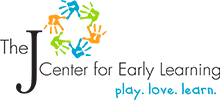The Reggio Emilia approach to Early Childhood Education began in Italy, shortly after WWII. Parents wanted schools where children could acquire the skills of critical thinking and collaboration in beautiful, stimulating environments. U.S. interest in Reggio Inspired Learning began in the late 1980’s, and then internationally in 1991, when a panel of experts commissioned by Newsweek Magazine hailed the Reggio Approach as an exemplary model of Early Childhood Education and identified the preschools of Reggio Emilia, Italy, in an in-depth look at the “best top ten schools in the world” (Newsweek 1991 – PDF). Today, leading educationalists and institutions are increasingly adopting the Reggio Approach for their programs. At The J the Reggio Approach takes shape in the form of an Emergent Curriculum and Project Based Learning.
The J Center for Early Learning is a Jewish Reggio inspired preschool that will provide a nurturing environment in which young children can grow and learn. Teachers engage childrens’ minds each day through exploration of new ideas in math, science, literacy and social studies. As our students are preparing for Kindergarten, they are preparing for life! Research has shown that strong communication and collaboration skills are crucial for later success in school and beyond, and these skills are developed during the early childhood years. We understand that children acquire skills and abilities along individual timetables, and we recognize that the role of the teachers is to carefully craft opportunities for discovery that allow children to reach their full potential. We are committed to enriching and educating the children through meaningful learning experiences that foster the development of the whole child. Because of our joint focus on strong pre-academics and collaboration, children who graduate from The J will be well-prepared for any school experience their parents choose for them in the future.
Our educators pay close attention to each student to design individualized experiences to fit each child’s learning style and ability, within the framework of the larger group setting. We pay careful attention to integrating math, science and literacy into each day’s learning and discovery. Children at The J are excited about learning, because we know that their ideas matter! Their teachers help them build on their prior knowledge about topics that interest them to keep them engaged, and seamlessly integrate further pre-academic learning into their experiences. In addition to intentional large and small group learning experiences in the areas of math, science, literacy and social studies, children are encouraged to integrate learning into their play. If the children decide to create a restaurant in Dramatic Play, teachers guide them to create menus (pre-writing) and use play money (math). When we bake challah, children follow a recipe (pre-reading) and observe the changes that happen throughout the process as the yeast affects the other ingredients and as the pliable dough turns into the finished, delicious, product (science)!
We recognize the importance of parents as the first teachers of their children. Cooperation and communication are vital for each child’s overall success and well-being. Through ongoing conversations, opportunities for parent education and involvement, we aim to strengthen and enrich the families and the community of the children we serve.
For more information, we invite you to enjoy this report from CNN that aired in the 1990’s, when America was first discovering the model of excellence in Early Childhood Education that is the Reggio Approach. It remains on the cutting edge, supported by brain research and child development experts and continues to be studied and implemented by vanguard educators worldwide.
Reggio Emilia Explained (YouTube)
Websites to visit if you want to learn more about the Reggio Approach and Project Approach:
Reggio Children (Italy)
Project Approach
North America Reggio Emilia Alliance
The Jewish Education Project
